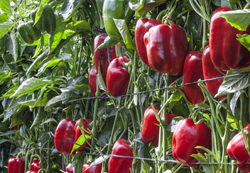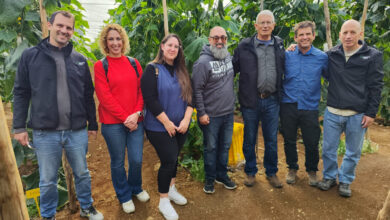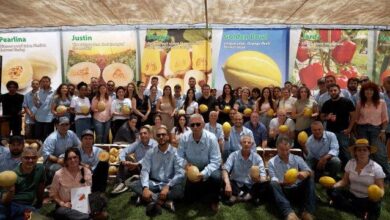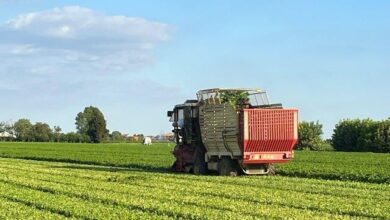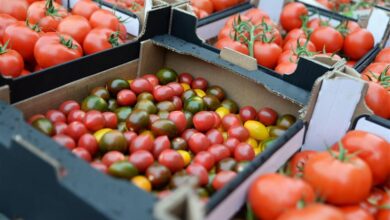it seems that the word pepper has become for a long time now, a synonym with the arava region, and for a good reason. about 70% of the green areas, meaning, the areas designat
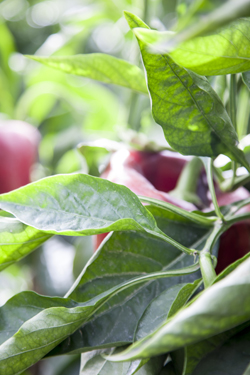
ed for agriculture, are used for growing delicious peppers. so, where do all these peppers go after they are ripped and picked? – to europe.
the agriculture in the arava region is definitely designated for export, over 95% of the peppers grown in the arava are sent to the european markets, mostly holland and england, other western european countries, russia and the ukraine. only a small portion remains for the local market consumption.
the export of peppers from the arava region has started over 20 years ago. at the beginning, the peppers were grown in open field, and over time, gradually, the main growth of peppers has shifted to
nethouses and greenhouses. one of the pepper growing pioneers at the arava was the faaran settlement, and other settlements have joined along the way.
arava growing conditions
even though peppers are a leading branch of export, the growers at the arava region deal with many issues and complicated challenges. in recent years, they have been affected by the state of the economy at their target market – europe, the low currency exchange rates, the expensive transportation, and the fierce competition with the wide variety of peppers from spain combined with the smaller purchasing power of the europeans. in addition, the cost of inputs is also on the rise, fertilizers, water, transportation and work force, and as always, the arava region imposes its harsh environmental conditions, the extreme weather, shortage of water, high salinity of the soil and the extremely high level of solar radiation. dealing with all these, both natural and man – made challenges, demands a new type of agriculture, professional and smart, and highly tolerant varieties of pepper to thrive in the extreme and ever changing weather conditions.
peppers species
one of the leading varieties of peppers at the arava is the “cannon” variety from zeraim gedera. this unique variety started as a breakthrough selection due to its extended shelf life, has proven over the years to be a highly durable and tolerant variety with great potential. the cannon pepper is characterized by high resistance to environmental and climatic changes and great success rate in bearing fruit even in cold weather conditions. it is exceedingly durable to factures, suitable for varying planting dates, shows stability in yielded crops over the years and provides maximum export quality yields..jpg)
another highly popular pepper in europe is the sobek variety from zeraim gedera. the sobek is also a blocky red type of pepper, its fruit is smaller than the cannon and it is more suitable to the western european market, where the most popular package is a set of 3 peppers at a total weight of 500 grams. side by side with sobek there is the ramona variety. the ramona pepper is close to the cannon variety in characteristics, but is also highly resistant to the tobacco mosaic virus . the ramona is a mature variety well adapted to the growth conditions at the northern arava region. some of the zeraim gedera varieties were developed and grown in israel, but are examined under various weather and climate conditions in other locations around the globe, such as spain, morocco, egypt and many more. for example, the cannon pepper is grown and marketed in mexico, where it is known to be a strong and stable pepper crop with a known success in achieving high yields.
still, genetics is not enough. great crops require quality genetics to adjust to a changing climate and environments, but also a professional growth strategy is a must. for this purpose, zeraim gedera has established its agro – technical unit – grontec.
grontec – agro-technical unit
grontec is considered a breakthrough unit in exploration and application of agro technical knowledge to improve growth management and bring forth a realization of genetic potential maximum advantage through true results, in the field. handling various stresses, and construction of healthier plants, yielding higher quality and quantity of crops, throughout the growth season. the role of the unit is performing field experiments in the company’s main markets, collaborating with the local growers with the intention to spread agricultural knowhow, and agro – technical knowledge, as well as providing new solutions. this is achieved through growth management of crops, handling stresses, building healthier plants populations which bears higher mass of crops throughout the growth season.
the unit continues its activity, where one of its future goals, side by side with continuing to increase the growth potential of the company’s varieties, is innovating with the issue of crops timing. israel competes at the present with the spanish growers which plant at a later date than the dutch growers which start planting earlier each year, so that the window of opportunity for the israeli crops is g
etting smaller over the years. the right timing of the crops can make all the difference in the world, and bring on the pick yields in months, which both the spanish and the dutch growers are less active. thus allowing the israeli growers to enjoy better market shares and higher profits. in addition, the unit operates to bring new solutions and advanced technologies to improve, and maximize the growth process, with computerized monitoring of growth processes to make the retrieved information ready at hand and reaching the growers and the unit’s support teams directly.
for further details about zeraim gedera

